Pregnant women in Gaza Strip face starvation, no anesthesia after 6 months of war
RAMALLAH, West Bank ? In the middle of what should have been a cause for joy and celebration ? in the middle of struggling to give life ? Amal Nassar thought mostly of death.
Nassar could hear powerful explosive blasts and gunfire as she lay in pain in the maternity ward of Al-Awdeh Hospital, which sits on the grounds of the Nuseirat refugee camp in the central Gaza Strip.
She thought that, at any moment, an Israeli missile could tear through the walls and that would be the end of it. The end of her. The end of a daughter whose journey would quietly end before it even started.
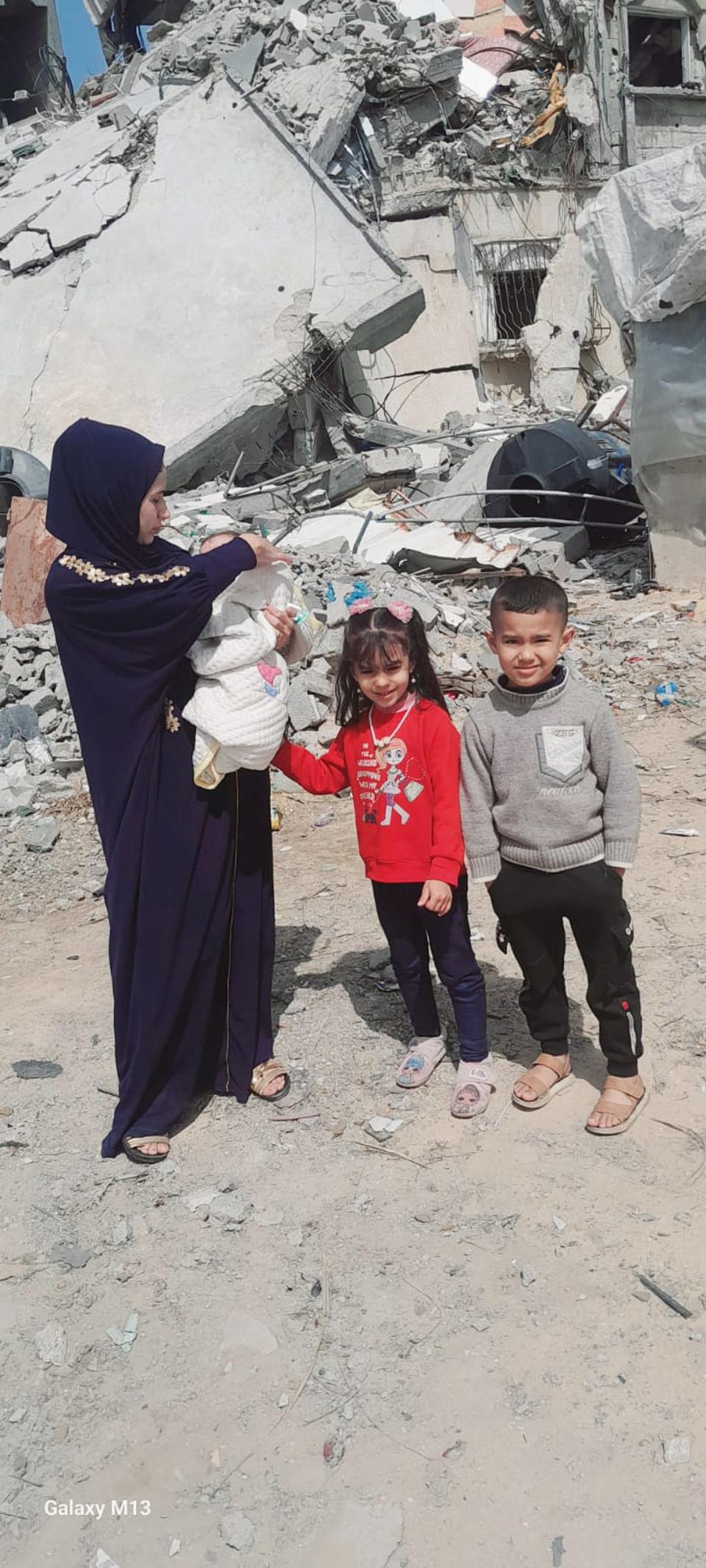
"I was muttering to myself, 'I hope I die,'" said Nassar, 34, an English teacher, recalling the birth of her daughter, Mira, in January. Nassar, like other Gazans spoken to for this story, was reached by phone in late March.
"I could hear people in the hospital's hallway outside my room crying about their sons and daughters who were injured. 'I hope I die' ? I kept saying it."
Six months into Israel's military offensive against Hamas in Gaza, its response to the deadliest attack on Israel since its founding in 1948, the human toll in the seaside enclave is devastating and expanding by the day. At least 32,000 Palestinians have been killed, according to the Hamas-run health ministry.
Humanitarian groups say more than 2 million people are threatened with famine. Satellite imagery shows that more than 30% of Gaza's buildings ? entire neighborhoods once teeming with schools, mosques, coffee shops, traffic, clothing stores, restaurants, sports fields ? have been reduced to rubble.
Six months into the war, international calls for a cease-fire have been unsuccessful. More than 130 hostages taken by Hamas on Oct. 7 during its rampage in southern Israel remain held in Gaza. Violence against Palestinians has spiked in East Jerusalem and the West Bank. If Israel presses ahead with its plan to launch a ground offensive to root out Hamas in Rafah, Gaza's southernmost city, the humanitarian catastrophe could escalate.
A war with no walls: Inside the devastating impact of Israel-Hamas war around the globe
While the war's impact on Gaza has been vast and in some ways immeasurable, it is also personal and intimate and illustrated in stories of new and expectant mothers seeking to care for and feed their children amid acute shortages of food, medicines, shelter and hospital care. The U.N. estimates that about 50,000 pregnant women are living in Gaza, and there are more than 180 births every day.
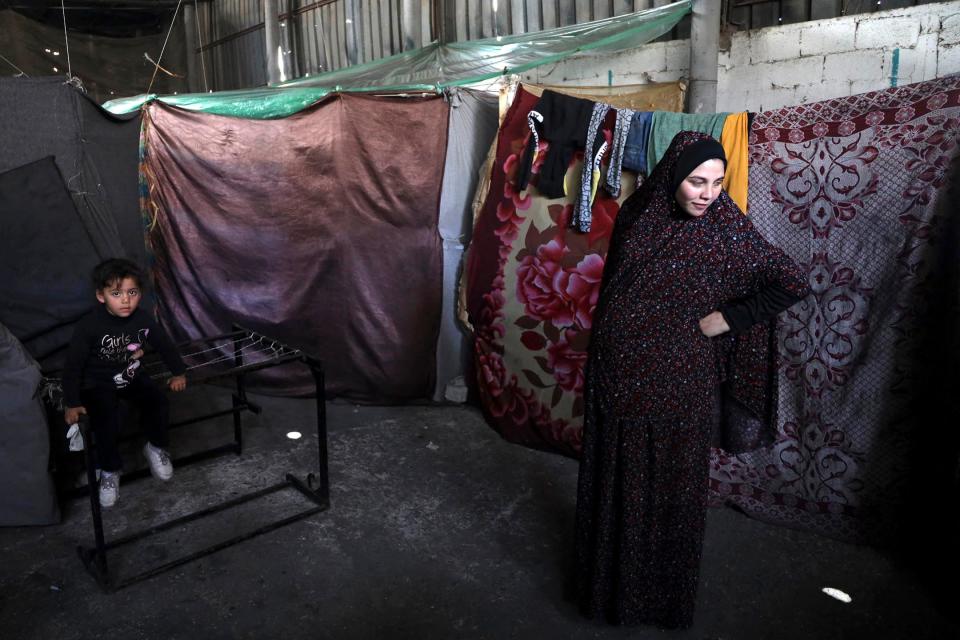
Pregnant women are some of the most endangered people in any conflict zone, from Ukraine to Sudan, aid groups and doctors say. But in Gaza, the plight for them is worse because they have no safe place to go. Islamic Relief Worldwide, an aid group, has characterized the catalog of difficulties and indignities pregnant women in Gaza are facing as "like a hundred years ago." In addition to the stress of constant bombardment, they are enduring cesarean sections without pain relief. They have no access to scans or checkups, no safe way to travel to hospitals or medical centers, most of which are no longer functional. Many are being forced to give birth on the floors of hospitals, in tents, in public restrooms.
"They live in absolutely horrible conditions," said Mustafa Barghouti, a Palestinian doctor and politician based in Ramallah in the West Bank. "They are very cold. If it's raining, there is no protection for them because many are in tents. Most, if not all, of them don't have access to enough vitamins essential for their babies' health."
Nahreen Ahmed, a critical care doctor from Philadelphia who returned from Gaza in late March, said every child she encountered in Kamal Adwan, a pediatric hospital in north Gaza, was malnourished. "Women aren't getting any kind of prenatal care. They themselves are coming in malnourished, underweight, and then that's leading to having newborn babies who are well underweight."
'Did we die?' A week in the life of a journalist in the Gaza Strip
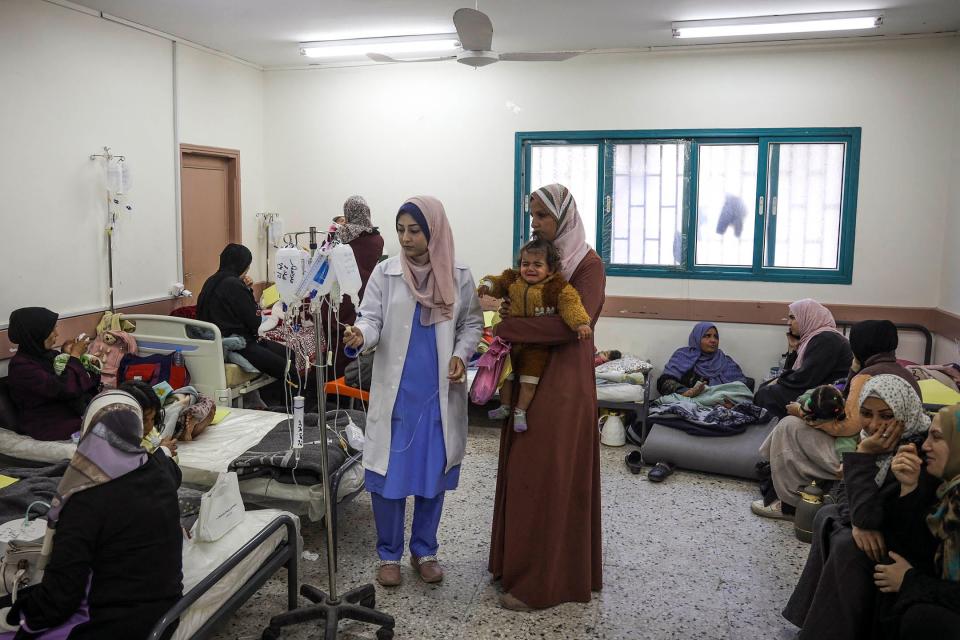

Looking for a hospital in a refugee camp while everyone else is fleeing
When Nassar entered the Nuseirat refugee camp to gain access to Al-Awdeh Hospital on Jan. 13, she noticed many people were fleeing in the opposite direction. She could hear the sounds of booming artillery, missile strikes and machine gun fire.
She saw that Israeli soldiers were operating inside Nuseirat. Israel was telling civilians in the area to move south, to Rafah, on the border with Egypt, or risk being killed.
But Nassar was already two weeks past her due date. The baby could come at any time. She felt her only option was to take her chances at Al-Awdeh Hospital. She had already tried the night before to gain admittance to the hospital. She was turned away; there was no room.
With no gas for taxis or cars, Nassar had walked almost 3 miles to the hospital and back with the war all around her.
Inside the hospital the next day people were lying around in various states of injury. In the labor ward, the phone lines were cut off. There was no internet access. The electricity cut out several times. Her husband had stayed at home with their two older children, Ahmad, 7, and Yara, 6.
"I worried I would return home and my kids would be gone," she said.
It was a difficult birth. Nassar needed stitches. There was no anesthesia or medication for pain relief. She was bleeding heavily, but doctors requested she leave 30 minutes after Mira was born.
When Nassar finally returned to her home in Deir Al-Balah, it was to a house she described as "50% damaged." Her family had been relatively lucky since the start of the war. Their building had not received a direct hit from an Israeli missile or artillery shell. But several months of near-misses and shrapnel had blown out windows and doors. Parts of the ceilings were collapsing.
"I looked at Mira and thought: 'Did I make the right decision to have this baby in a war?'"
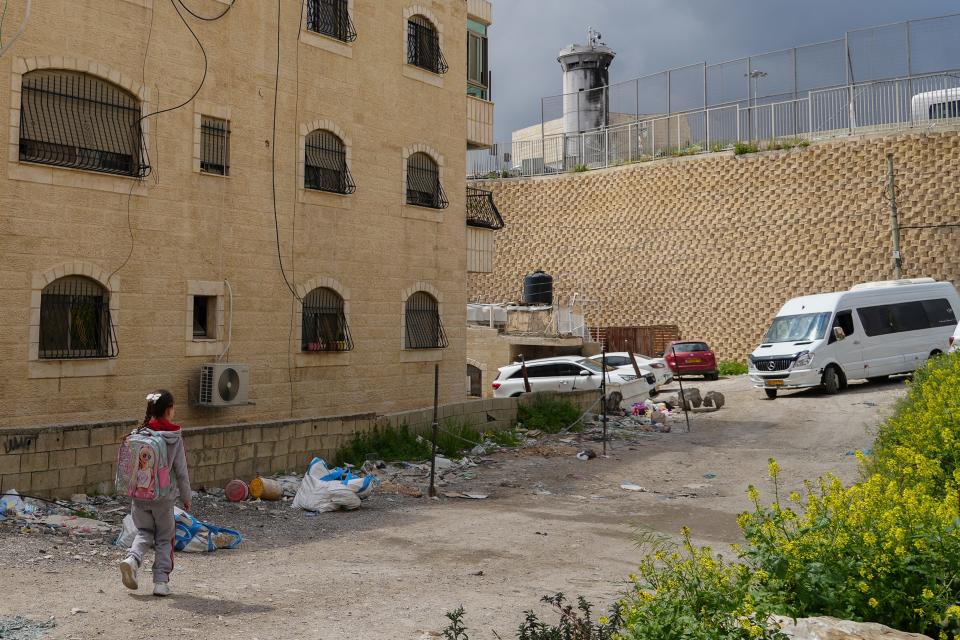

'I have managed to buy one diaper so far'
Night after night for the past six months, such thoughts also come hauntingly to Akram Elloh, 40, and his wife, Shayma'a Abu Ghalyoun, 32, who is seven months' pregnant with twin boys. They are also staying in Deir Al-Balah, a city once known for plentiful palm trees that have all but disappeared, either obliterated in Israel's bombardment or cut down for cooking fuel.
They moved into the home of Abu Ghalyoun's parents, where dozens are living, after an Israeli airstrike destroyed their house. Elloh suffered burns to his face.
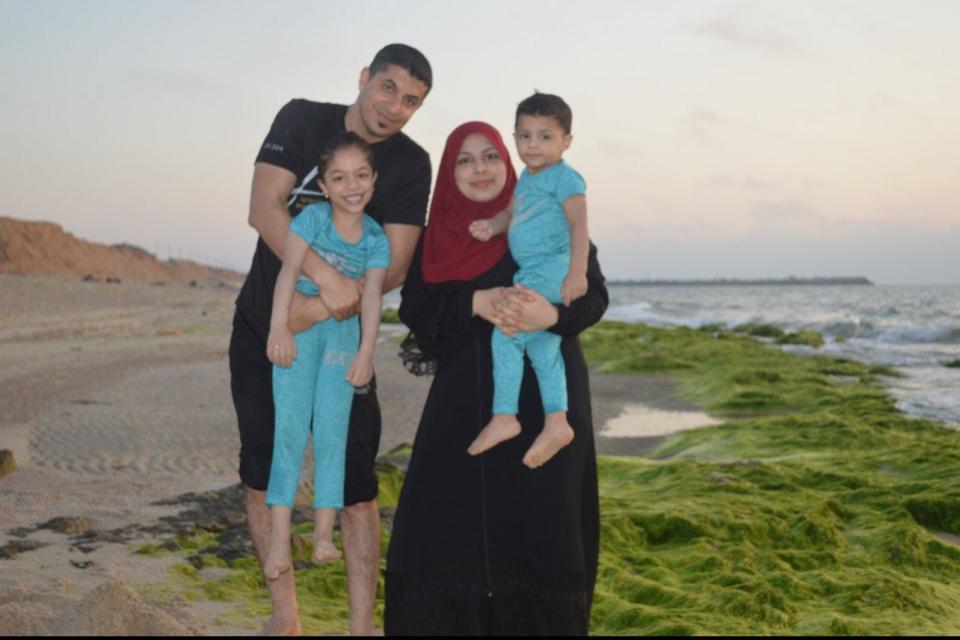
"We didn't want this pregnancy. In the end, we gave into it because it is God's gift to us," said Elloh, a journalist for a newspaper affiliated with the Palestinian Authority, which exercises civil control over parts of the West Bank. The Palestinian Authority was thrown out of Gaza by Hamas almost two years after Israel withdrew its troops and dismantled its settlements there in 2005.
They are more well off than most. Elloh is paid about $500 a month, roughly 60% of his salary before the war. But as prices for basic goods and supplies have risen in Gaza and humanitarian aid remains scarce, it's still not enough.
The World Food Programme said in a report in late March that 2.2 million people in Gaza are facing "high levels of acute food insecurity." The U.N.-run organization projected that famine would hit northern Gaza, where the U.N. says about 300,000 Palestinians remain trapped, before the end of May.
He's digging for water on the Moon: He hasn't been able to find a way to get water to Gaza
Humanitarian groups say trucks loaded with food and medicines are still not getting through from Egypt quickly enough. They say air aid drops from the U.S. and European and Arab countries, as well as a fledgling sea corridor for humanitarian aid, are not enough to meet the demand in Gaza for lifesaving supplies. Israel says Hamas is looting a lot of the aid that does get through, and it has rejected accusations that it is blocking aid or that there is an impending famine in Gaza.
Israeli airstrikes that killed seven aid workers from the World Central Kitchen, a nonprofit organization that was delivering food to besieged Palestinians, further complicate efforts to help.
For now, Elloh is consumed with fear, anxiety and guilt over how to make sure Abu Ghalyoun gets enough meat, fruit and vegetables to stay healthy while she is pregnant with the twins. And when the twins come along, he worries how the family will be able to feed and clothe them.
"I have managed to buy one diaper so far," he said. "The worst scenario for us will be if the twins are born before their time" and require an incubator, he said. There's no guarantee the hospital will have one, or that the hospital will have power.
Like Nassar, Abu Ghalyoun plans to give birth at Al-Awdeh Hospital. From their temporary home in Deir Al-Balah, it is several hours' walk. She is not sure how she will get there.

War in Gaza, Palestinian impact
The impact of the war has not been confined to those Palestinians who are in Gaza. It has also brought misery for their relatives and others in Palestinian areas.
Over the past six months, violence against Palestinians in East Jerusalem and the West Bank has intensified.
Rami Hamdan was shot and killed by an Israeli police sniper on March 12 a few yards from his home near a garbage-strewn alley after he lit the fuse of a firework and hoisted it in the air.
Israel says it is investigating the incident.
"He was like any other young boy. Active. Optimistic. Looking to the future," said his mother, Rawya Hamdan, 53, surrounded by her daughters, grandchildren and Rami's pet fish and parrot.
For many Palestinians not in the enclave, thinking about Gaza is their everyday.
"What you are looking at is a broken woman," said Suzi Ibrahim Bozom, 40, a civil servant, as she spoke in the kitchen of her cold, dark basement apartment off a busy street in Ramallah.
Bozom's father was killed in an Israeli airstrike in Gaza in October. He bled to death. And Bozom has not heard from her mother since November, when she lost contact with her as Israel's military raided a hospital where she was sheltering. Her body has not been recovered.
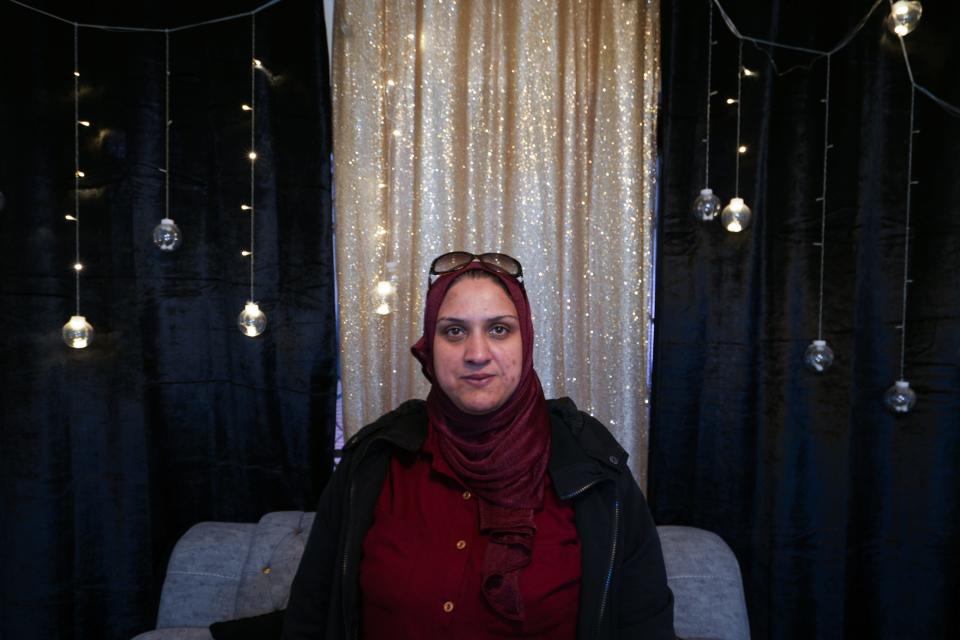
Most days, Bozom calls her sisters and brothers in Gaza. More often than not there is no answer. It could be bad cellphone service. They could be dead. She never knows.
One of Bozom's children slept soundly on a nearby sofa under a thick blanket. A small festive display with traditional Islamic patterning and glistening golden lights to mark Ramadan, the Muslim holy month that's expected to end April 9, was neatly arranged in one corner of the kitchen.
"My sister is telling me they are having to eat the grass. Can you imagine. What is their crime?"
This article originally appeared on USA TODAY: Pregnant women in Gaza are starving, face perils at 6-months of war
